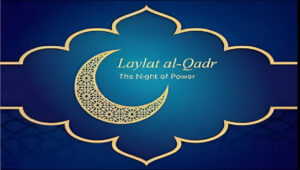
Introduction
Laylat al-Qadr, the “Night of Power” or “Night of Destiny,” is among the most mystical and spiritually potent concepts in the Qur’anic worldview. Traditionally understood as the night on which the Qur’an was revealed, it is more than a historical or devotional milestone, it is a window into the Divine realm, a portal between the temporal and eternal, and a reminder of the immense potential
embedded in human consciousness.
This essay seeks to move beyond the normative, juridical, and ritualistic frames and explore Laylat al-Qadr through a transcendental, esoteric, and modern intellectual lens—one that resonates with the seeker of the eternal and the rational mind alike.
I. The Normative Reading of Sūrat al-Qadr
Let us begin by grounding the discussion in the text:
“Indeed, We sent the Qur’an down in the Night of Power (Laylat al-Qadr).
And what will make you know what the Night of Power is?
The Night of Power is better than a thousand months. The angels and the Spirit descend therein by permission of their Lord for every affair.
Peace it is until the rising of the dawn.”
(Sūrat al-Qadr, 97:1–5)
The conventional interpretation emphasizes the historical moment when the Qur’an began to be revealed to the Prophet Muhammad (peace be upon him), during one of the last ten nights of Ramadan. Worship on this night is said to be equivalent to a thousand months (over 83 years) of devotion. Muslims are encouraged to seek it through intensified prayer, Qur’anic recitation, and supplication.
But this literal reading only scratches the surface of its metaphysical richness.
II. The Esoteric and Sufi Understanding: A Descent Into the Heart
1. Layla as the Mystical Beloved
The word “Layla” (night) in Sufi poetry and Qur’anic exegesis often symbolizes the Beloved, the hidden essence of God. Just as the night veils things from the eye, so too does the Divine Essence remain veiled from most. Yet for the lover, Layla is also the time of intimacy, longing, and union. Ibn ‘Arabi, the great Andalusian mystic, sees Laylat al-Qadr as the mystical womb of Divine secrets—a night that births infinite potential in the heart of the receptive servant.
2. Qadr as Power and Constriction
The word Qadr shares a root with taqdir (destiny) and qadara (to measure or to constrain). Esoterically, Laylat al-Qadr is the moment where the Infinite constrains itself into finite expression, the Infinite Light compressed into human words. As Nasr Abu Zayd wrote, the Qur’an is not a “text” in the modern sense but a living event, a divine self-disclosure into temporal language.
III. The Transcendental Meaning: Night as Metaphor for the Soul’s Journey
1. The Descent of the Angels and the Spirit
Verse 4 says, “The angels and the Spirit descend therein…” This descent is not bound to physical vision. According to the philosopher and mystic Mulla Sadra, this descent reflects a spiritual illumination, where the faculties of the soul are inspired, and the intellect is awakened by angelic truths. The “Spirit” (al-Ruḥ) interpreted by many scholars as the Archangel Gabriel also represents the Divine Command or Universal Intellect, as per Neoplatonic and Islamic cosmology.
2. Night as the Soul’s Inner Darkness
Night is also a metaphor for the inner condition of the seeker: moments of confusion, obscurity, and uncertainty. Laylat al-Qadr represents the turning of that darkness into a stage of revelation, where guidance pierces through the hiddenness, transforming the seeker’s heart into a locus of divine light.
IV. The Modern Intellectual Lens: A Night Beyond Chronology
1. Laylat al-Qadr as a Liminal Space of Consciousness
In the postmodern world, we are inundated with noise and distraction. Laylat alQadr offers an invitation into sacred mindfulness, a plunge into the deep now. In this sense, the night is not a moment on a calendar but a state of being: anytime we enter a space of radical presence and openness to divine guidance, we enter the energy of Laylat al-Qadr.
2. The “Thousand Months” as a Symbolic Measure of Transformation
The phrase “better than a thousand months” can also be read symbolically. This “thousand” could represent a lifetime, implying that one moment of true presenc eand divine union can outweigh an entire life lived unconsciously. Laylat al-Qadr is the Islamic language for this kind of experience, deeply grounded in ritual and cosmic mystery.
V. Practical Implications for the Contemporary Muslim
1. Seek the Night Within
Laylat al-Qadr is not only to be searched for in the last ten nights of Ramadan but also within the depths of one’s heart. Seek the night when distractions subside, and the heart becomes still enough to receive divine secrets.
2. Transcend Ritual into Presence
While traditional practices such as prayer, recitation, and supplication remain central, the seeker must go beyond form into essence. What matters most is not the external length of devotion but the depth of presence achieved.
3. Embrace Divine Destiny (Qadr) as Unfolding, Not Predetermined
Laylat al-Qadr is also the night of decree. But this does not mean fatalism. Rather, it invites us to embrace destiny as a dynamic interplay of divine grace, personal choices, and unseen realities. In this way, the believer becomes a co-author with God in shaping their life’s path.
Conclusion: A Night Beyond Time
Laylat al-Qadr is not merely a night, it is a spiritual state, an archetypal reality, and an invitation to the heart. It is the moment when the Divine descends into the human, when the Eternal meets the Now, and when the soul becomes a mirror for the Divine Word.
Select References
• Ibn ‘Arabi. *The Bezels of Wisdom* (Fusus al-Ḥikam). Trans. R. W. J. Austin.
• Reza Shah-Kazemi. *The Spirit of Tolerance in Islam.* I.B. Tauris, 2012.
• William Chittick. *The Sufi Path of Knowledge: Ibn al-‘Arabi’s Metaphysics of Imagination.*
• Seyyed Hossein Nasr. *The Garden of Truth: The Vision and Promise of Sufism, Islam’s Mystical Tradition.*
• Mulla Sadra. *The Transcendent Theosophy*. Ed. and trans. James W. Morris.
• Carl Jung. *The Archetypes and the Collective Unconscious.*
• Abraham Maslow. *The Farther Reaches of Human Nature.*


